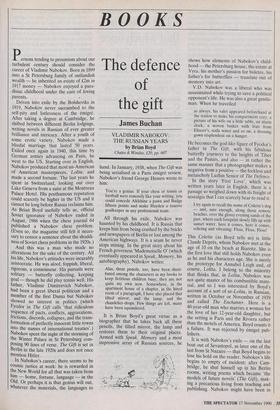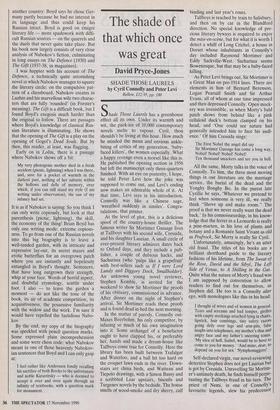BOOKS
The defence of the gift
James Buchan
VLADIMIR NABOKOV: THE RUSSIAN YEARS by Brian Boyd
Chatto & Windus, £20, pp. 607
Persons tending to pessimism about our turbulent century should consider the career of Vladimir Nabokov. Born in 1899 into a St Petersburg family of outlandish wealth — he inherited an estate of £2m in 1917 money — Nabokov enjoyed a para- disiac childhood under the care of loving parents. • Driven into exile by the Bolsheviks in 1919, Nabokov never succumbed to the self-pity and listlessness of the emigre. After taking a degree at Cambridge, he shifted between different Berlin lodgings, writing novels in Russian of ever greater brilliance and intricacy. After a youth of some erotic variety, Nabokov made a blissful marriage that lasted 50 years. Exiled once again in 1940, this time by German armies advancing on Paris, he went to the US. Starting over in English, Nabokov produced that most un-American of American masterpieces, Lolita, and made a second fortune. The last years he spent in Switzerland, looking out over Lake Geneva from a suite at the Montreux Palace Hotel. His posthumous reputation could scarcely be higher in the US and it cannot be long before Russia reclaims him. As Brian Boyd usefully tells us, official Soviet ignorance of Nabokov ended in August, 1986 when the chess journal 64 published a Nabokov chess problem. (Even so, the magazine still felt it neces- sary to censor a sentence about the shoddi- ness of Soviet chess problems in the 1920s.) And this was a man who made no alterations for the sake of the century. All his life, Nabokov's attitudes were incurably aristocratic, He was aloof, foppish, liberal, rigorous, a connoisseur. His pursuits were solitary — butterfly collecting, keeping goal — though he did play tennis well. His father, Vladimir Dimitrevich Nabokov, had been a great liberal politician and a member of the first Duma but Nabokov showed no interest in politics (which Fyodor in The Gift calls 'that ridiculous sequence of pacts, conflicts, aggravations, frictions, discords, collapses, and the trans- formation of perfectly innocent little towns into the names of international treaties'.) Nabokov spent the night of the storming of the Winter Palace in St Petersburg com- posing 90 lines of verse. The Gift is set in Berlin in the late 1920s and does not once mention Hitler.
In Nabokov's career, there seems to be cosmic justice at work: he is rewarded in the New World for all that was taken from him — home, fortune, language — in the Old. Or perhaps it is that genius will out, whatever the materials, the languages to hand. In January, 1938, when The Gift was being serialised in a Paris emigre review, Nabokov's friend George Hessen wrote to him:
You're a genius. If your chess or tennis or football were remotely like your writing, you could concede Alekhine a pawn and Budge fifteen points and make Hayden a reserve goalkeeper in any professional team.
All through his exile, Nabokov was haunted by his childhood. It is Russia that keeps him from being crushed by the bricks and newspapers of Berlin or lost among the American highways. It is a seam he never stops mining. In the great story about his French governess 'Mademoiselle 0' (which eventually appeared in Speak, Memory, his autobiography), Nabokov writes:
Alas, these pencils, too, have been distri- buted among the characters in my books to keep fictitious children busy; they are not quite my own now. Somewhere, in the apartment house of a chapter, in the hired room of a paragraph, I have also placed that tilted mirror, and the lamp, and the chandelier-drops. Few things are left, many have been squandered.
It is Brian Boyd's great virtue as a biographer that he takes back all these, pencils, the tilted mirror, the lamp and restores them to their original places. Armed with Speak, Memory and a most impressive array of Russian sources, he shows how elements of Nabokov's child- hood — the Petersburg house, the estate at Vyra, his mother's passion for boletes, his father's for butterflies — translate out of memory into art.
V.D. Nabokov was a liberal who was assassinated while trying to save a political opponent's life. He was also a great gentle- man. When he travelled
as always, his valet appeared beforehand at the station to make his compartment cozy: a picture of his wife on a little table, an alarm clock, a woven basket with fruit from Eliseev's, soda water and so on, a dressing gown resplendent on a hanger.
He becomes the god-like figure of Fyodor's father in The Gift, with his fabulous butterfly journeys to the heights of Tibet and the Pamirs, and also — in rather the same manner that a photographer makes a negative from a positive — the feckless and melancholy Luzhin Senior of The Defence.
In the story 'First Love', which was written years later in English, there is a passage so weighed down with its freight of nostalgia that I can scarcely bear to read it:
I try again to recall the name of Colette's dog — and, sure enough, along those remote beaches, over the glossy evening sands of the past, where each footprint slowly fills up with sunset water, here it comes, here it comes, echoing and vibrating: Floss, Floss, Floss!
This Colette (as Boyd tells us) is little Claude Depres, whom Nabokov met at the age of 10 on the beach at Biarritz. She is the first love that still holds Nabokov even as he and his characters age. She is surely the prototype for Annabel Leigh and, of course, Lolita. I belong to the minority that thinks that, in Lolita, Nabokov was not quite master of his combustible mate- rial, and so I was interested by Boyd's account of a sort of ur-Lolita, in Russian, written in October or November of 1939 and called The Enchanter. Here is a 40-year-old man who marries a woman for the love of her 12-year-old daughter, but the setting is Paris and the Riviera rather than the motels of America. Boyd counts it a failure. It was rejected by émigré pub- lishers.
It is with Nabokov's exile — on the last boat out of Sevastopol, as later one of the last from St Nazaire — that Boyd begins to lose his hold on the reader. Nabokov's life begins to empty of incident: after Cam- bridge, he shut himself up in his Berlin rooms, writing poems which became 'the models of future novels' (The Gift), mak- ing a precarious living from teaching and publishing. Nabokov might have been in another country: Boyd says he chose Ger- many partly because he had no interest in its language and thus could keep his Russian intact. Boyd is good on émigré literary life — more spadework with' diffi- cult Russian sources — on the quarrels and the duels that never quite take place. But his book now largely consists of very close analysis of Nabokov's fiction, culminating in long essays on The Defence (1930) and The Gift (1937-38, in magazines).
I was happier with his account of The Defence, a technically quite astonishing novel in which Nabokov manages to square the literary circle: on the compulsive pat- tern of a chessboard, Nabokov creates in Luzhin and his marvellous wife two charac- ters that are fully 'rounded' (in Forster's meaning). The Gift is a difficult book, but I found Boyd's exegesis much harder than the original to follow. There are passages where Boyd's knowledge of classical Rus- sian literature is illuminating. He shows that the opening of The Gift is a play on the opening of Gogol's Dead Souls. But by then, this reader, at least, was flagging.
Early on in Lolita, there is a passage where Nabokov shows off a bit:
My very photogenic mother died in a freak accident (picnic, lightning) when I was three, and, save for a pocket of warmth in the darkest past, nothing of her subsists within the hollows and dells of memory, over which, if you can still stand my style (I am writing under observation), the sun of my infancy had set.
It is as if Nabokov is saying: So you think I can only write copiously, but look at that parenthesis (picnic, lightning), the skill, the economy of the thing! Brian Boyd has only one writing mode: extreme copious- ness. To go from one of the Russian novels into this big biography is to leave a well-tended garden, with its intricate and expressive lay-out, its secret mazes and erotic butterflies for an overgrown patch where you are instantly and hopelessly entangled in Boyd's thought. Sentences,. that have long outgrown their strength, whip at your face. Words of horrid aspect, and doubtful etymology, scuttle under foot. I also — to leave the garden a moment — do not like the tone of the book, its air of academic competition, its acquisitiveness, the possessive familiarity with the widow and the work. I'm sure it would have repelled the fastidious Nabo- kov.
By the end, my copy of the biography was speckled with pencil question marks. Some expressed plain incomprehension and some were chess code: what Nabokov meant in one of those heavenly Nabokov- ian sentences that Boyd and I can only gasp at:
I feel rather like Anderssen fondly recalling his sacrifice of both Rooks to the unfortunate and noble Kieseritsky — who is doomed to accept it over and over again through an infinity of textbooks, with a question mark for monument.
























































 Previous page
Previous page